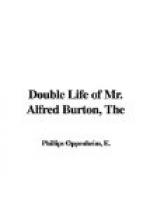He produced the beans from his pocket and Ellen took a step forward. The shortness of her breath and the glitter in her eyes should have warned him. The greatness of his subject, however, had carried him away. His attention was riveted upon the beans lying in the palm of his hand. He looked at them almost reverently.
“Are those the things?” she demanded.
He held them out towards her. A faint pang of regret stirred his heart. For a single second the picture of a beautiful garden glowed and faded before his eyes. A wave of delicious perfume came and went. The girl—slim, white-clad—looked at him a little wistfully with her sad blue eyes. It was a mirage which passed, a mirage or some dear, vanishing dream.
“Take one yourself, Ellen,” he directed. “Keep the other one carefully for Alfred.”
She snatched them from his hand and before he could stop her she had thrown them out of the open window into the street. He was, for an instant, stricken dumb.
“And you,” she cried fiercely, “you can follow your—beans, as soon as you choose!”
He looked at her and realized how completely he had failed. She was indeed stirred to the very depths of her nature, but the emotion which possessed her was one of passionate and jealous anger.
“Not good enough for you as we are, eh?” she cried. “You don’t like our clothes or our manners! You’ve got to be a fine gentleman in five minutes, haven’t you? We were good enough for you when thirty shillings a week didn’t seem enough to keep us out of debt, and I stitched my fingers to the bone with odd bits of dressmaking. Good enough for you then, my man, when I cooked your dinner, washed your clothes, kept your house clean and bore your son, working to the last moment till my head swam and my knees tottered. Truth! Truth, indeed! What is there but truth in my life, I’d like to know? Have I ever told you a lie? Have I ever looked at another man, or let one touch my fingers, since the day when you put that ring on? And now—take it—and get out!”
She wrenched her wedding ring from her finger and threw it upon the ground between them. Her bosom was heaving; her cheeks were red and her eyes glittering. Several wisps of her hair had been unable to stand the excitement and were hanging down. The mauve bow had worked its way on to one side—very nearly under her ear. There was no deceit nor any pretence about her. She was the daughter of a washerwoman and a greengrocer, and heredity had triumphantly asserted itself. Yet as he backed towards the door before her fierce onslaught, Burton, for the first time since this new thing had come, positively admired her.
“Ellen,” he protested, “you are behaving foolishly. I wanted you and the boy to understand. I wanted you to share the things which I had found. It was the only way we could be happy together.”
“Alfred and I will look after ourselves and our own happiness,” she declared, with a little gulp.




